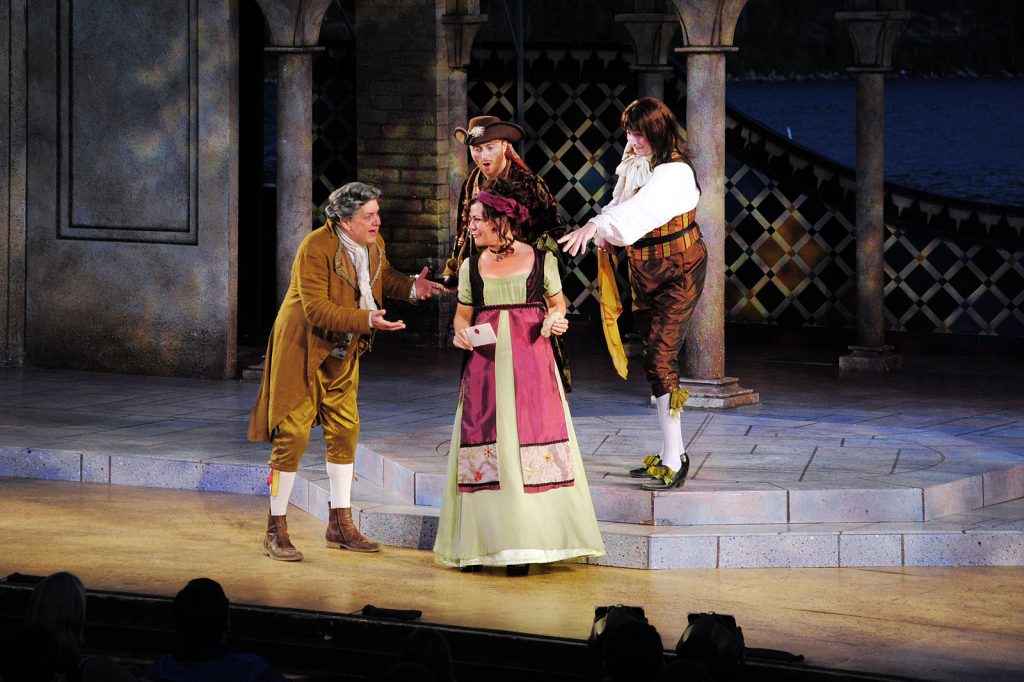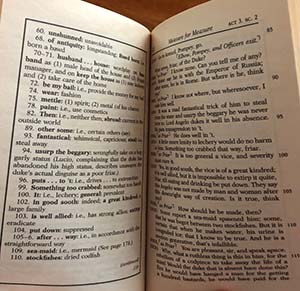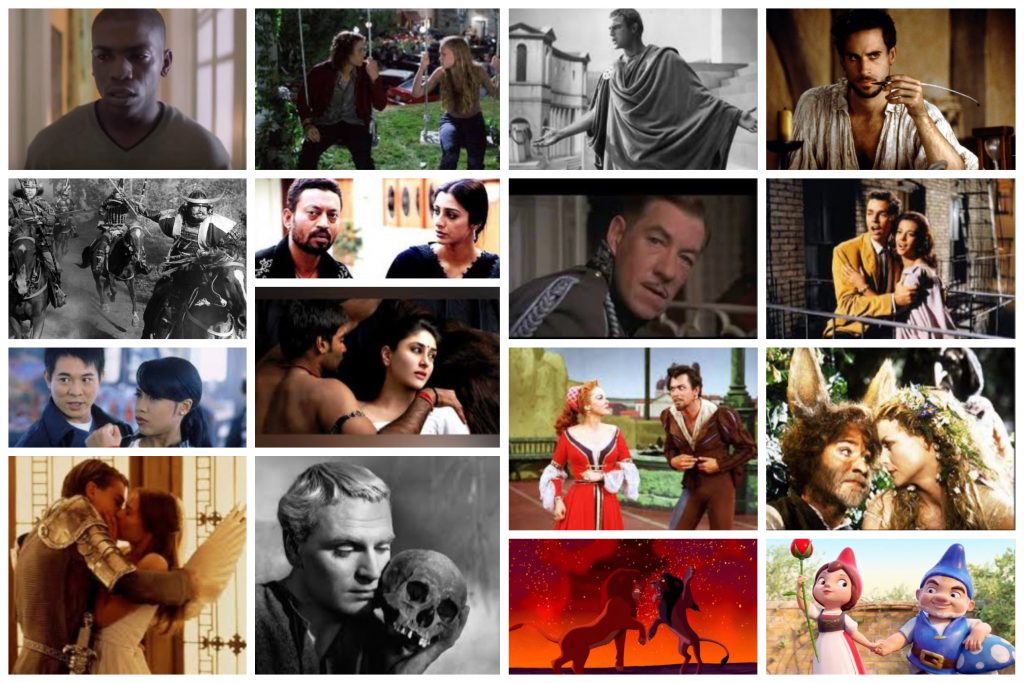
This week, March 18–24, marks Shakespeare Week, a national endeavor in the United Kingdomw (UK) to celebrate William Shakespeare and bring awareness of his work to young children. Created by the Shakespeare Birthplace Trust, the week will expose almost 2 million children in the UK to the Bard and his work.
And for good reason.
Between his 38 plays and his 154 sonnets, Shakespeare wrote 884,647 words. While there are authors who have written more plays or more sonnets or more words, there are few whose words we remember as well.
We remember the words because they resonate with us even over 400 years after Shakespeare “shuffled off this mortal coil.”
Even if you have never read one of his works or seen one of his plays, chances are you know the name “Shakespeare” and can name at least one of his plays or quote one of his lines.
“To be or not to be: that is the question” (Hamlet Act 3, Scene 1). Sound familiar?
He makes us laugh, and he makes us cry because his insight into the human heart and pysche has depth.
Shakespeare understood that love and hate, greed and generosity, jealousy and ambivalence, life and death, loyalty and betrayal live inside all of us. Humans are complex beings. And Shakespeare used our complexities — our emotions and experiences — and deftly dramatized them.
With complex characters and universal themes, Shakespeare’s works are thought-provoking and powerful. We are supposed to see ourselves and our worlds in his plays.
If that isn’t compelling enough, the language is gorgeous. Lyrical and witty, playful and biting, Shakespeare’s words are as likely to entertain us as they are to gut us. He makes us feel, and we all should thank him for that.
Whether you want to get to know the Bard better or you would like to celebrate Shakespeare Week or you are preparing to celebrate his birthday on April 23, here are 5 ways for you to celebrate Shakespeare.
1. See a live performance.
The best way to experience the magic of Shakespeare’s words is in their natural habitat — live on stage. The plays were written to be spoken aloud. The dialogue, the plots, the characters all come alive when performed live.
A big advantage the stage has over the page is its ability to give more context.
When reading early forms of English, it is easy to get lost in things, such as spellings, syntax, unfamiliar words, and words with alternate usages, that are different from our current form of English.
That can lead to frustration and confusion. And because the focus is on trying to decipher each specific word, the broader picture the play is painting can be missed.

But when you see a live performance, you can more easily discern what is going on because you can read the context clues.
You can see what is physically happening on stage, which allows your brain to put things together.
The ability to see facial expressions, body language, and spacial relationships helps provide context, which allows you to focus on why things are happening, not just what is happening.
Hearing the dialogue enables you to figure out tone, intention, and subtext — when someone is joking or not, when someone says one thing but means another, who words are directed to or spoken about.
Live performance enriches the experience beyond measure.
Go See A Show
Groups around the world perform Shakespeare regularly.
The website Shakespeareances breaks down performances across the United States and parts of Canada by play, while the Shakespeare Resource Center lists specific Shakespearean theater companies in the United States.
And all the chapters of the WNBA have either a resident Shakespeare company in their city or an annual Shakespeare Festival nearby.
Atlanta: Shakespeare Tavern Playhouse & Rome Shakespeare Festival
Boston: Commonwealth Shakespeare Company
Charlotte: North Carolina Shakespeare Festival & Shakespeare Carolina
Greater Lansing: The Michigan Shakespeare Festival
Los Angeles: The Shakespeare Center of Los Angeles & the Independent Shakespeare Co.
Nashville: Nashville Shakespeare Festival
New Orleans: New Orleans Shakespeare Festival at Tulane
New York City: Free Shakespeare in the Park
Philadelphia: Philadelphia Shakespeare Festival & Phliadelphia Shakespeare Theatre
San Francisco: San Francisco Shakespeare Festival
South Florida: Florida Shakespeare Theatre & Palm Beach Shakespeare Festival
Washington D.C.: The Folger Theatre & Shakespeare Theatre Company
If you have the means and opportunity, nothing can compare with visiting Stratford-upon-Avon. There the Shakespeare Birthplace Trust manages 5 family homes. You can visit Shakespeare’s final resting place at the Church of the Holy Trinity. The Royal Shakespeare Company (RSC) provides year-long entertainment.
 |
 |
 |
And for those of you who are up for a fun challenge, try acting in one of his plays. Jumping into character is a great way to figure out what is going on!
2. Read/Listen to Shakespeare’s work.
A common conception is that Shakespeare’s words are inaccessible. While the language can be tricky at times, don’t get discouraged. Read a copy with helpful notes.

And what better place to buy a copy of Much Ado About Nothing (my favorite) then at Shakespeare & Co. The popular independent bookstore located in New York (now with two Manhattan locations) has opened its first non-NYC location in Rittenhouse Square in Philadelphia. So, happy shopping, WNBA-NYC and WNBA-Greater Philadelphia!

If you like to read digitally, you can find Shakespeare’s complete works on Project Gutenberg or at your local library.
Retellings
Shakespeare retold many stories, so it is only natural that others reimagine his work. Hogarth Shakespeare features retellings by authors such as Tracy Chevalier, Gillian Flynn, Jo Nesbo, and Margaret Atwood.
Check out these recommended Shakespeare-inspired teen novels, too.
Read Aloud
The best thing you can do for yourself when you are reading Shakespeare is to read it aloud. You’ll hear the words differently and experience the rhythm of the language.
If you’d rather not read aloud to yourself, have someone read aloud to you. This could be a friend, or it could be the narrator on an audiobook.
Audiobooks and Files

The quality of audiobook narration has improved quite a lot over the past few years, so check it out. While the convenience of downloading audio is a helpful, the ability to hear professionals deliver the dialogue is the true benefit.
You can get audio of Shakespeare in multiple places:
- Local libraries have audiobooks you can check out for free
- Audible has audiobooks
- Naxo Audiobooks has a selection of audio recordings from live performances
- Folger Shakespeare Library
- Podcasts
- Audio Editions
- Radio Documentaries
- Lectures
- Speak the Speech is an audio theater company that provides free Shakespeare productions
- Podcasts (Select list)
- American Shakespeare Center
- Approaching Shakespare
- BardCast
- Let’s Talk Shakespeare
- No Holds Bard
- Oregon Shakespeare Festival
- Reduced Shakespeare Company
- Royal Shakespeare Company (RSC)
- Shakespeare Underground
3. Watch adaptations.
The plays have been adapted in many different ways. While stage adaptations are by far the most common form of adaptation, they are by no means the only kind.
Filmed Stage Performances
Filmed stage performances provides the opportunity for us to see the performance even though we missed it live. While the magic of live theater cannot be recreated on-screen, watching a filmed performance can still be very powerful.
PBS, the RSC, and the National Theatre often provide filmed performances for us to enjoy.
PBS shows a lot of Shakespeare-related programming on its own (especially documentaries). And the RSC partners with PBS to show selected performances in the US, as well as has its own service, The RSC Live Collection, which currently houses 17 adaptations.

If you miss the shows on PBS, you can check Amazon Prime Video or PBS Passport as there is usually a selection of great performances on both services.
The National Theatre Live releases filmed performances in movie theaters. Check your movie theater for dates to these performances scheduled to be in select theaters this year:
- Antony & Cleopatra with Ralph Fiennes and Sophie Okonedo
- Hamlet with Benedict Cumberbatch
- King Lear with Ian McKellen
- Macbeth with Rory Kinnear and Anne-Marie Duff
- The Tragedy of King Richard the Second with Simon Russell Beale
Films
The Guinness Book of World Records lists over 400 film adaptations of Shakespeare’s plays. IMDB lists over 1,419 writing credits for William Shakespeare (33 of which haven’t even been released yet).
That is a lot of films and television shows based, at least in part, on the content of 38 plays and 154 sonnets.
But people keep adapting Shakespeare’s work because it is still relatable. And it is still entertaining.
The variety in the adaptations keeps the core material fresh. There truly is something for everyone.
Popular Shakespeare Adaptations
If you like:
- classic films, Laurence Olivier delivers some of the most notable Shakespearean performances caught on film in King Henry V (1947), Hamlet (1948), and Richard III (1955).
- musicals, check out Kiss Me Kate (1953) and West Side Story (1961).
- animated movies with a musical bent, then The Lion King (1994) and Gnomeo and Juliet (2011) might be for you.
- Bollywood, try Maqbool (2003) and Omkara (2006).
- teenage films, Romeo & Juliet (1996), Romeo Must Die (2000) and O (2001). should fill your angst needs.
- fun romps, escape with A Midsummer’s Night Dream (1999) and Shakespeare in Love (1998).
- political machinations, Julius Caesar (1953) and Richard III (1995) should entertain you.
- Japanese films, you should watch Akira Kurosawa’s Throne Of Blood (1957), The Bad Sleep Well (1960), and Ran (1985).
- romantic comedies, then don’t miss 10 Things I Hate About You (1999).
- virtual reality, grab some goggles and watch Hamlet 360: Thy Father’s Spirit—Shakespeare in VR.
The film adaptations vary greatly in their quality and authenticity. Some mirror Shakespeare’s work closely, while others use features like the plot or a specific character to focus on.
One of the most consistent and thoughtful Shakespearean filmmakers is Kenneth Branagh.
Kenneth Branagh’s Shakespeare

Both an actor and a director, Kenneth Branagh is considered by many to be the best modern film interpreter of Shakespeare. Branagh provides audiences with the opportunity to connect with Shakespeare’s language through his fairly faithful and well-produced adaptations.
Shakespeare-Related Filmography:
- Henry V (1989)
- Much Ado about Nothing (1993)
- A Midwinter’s Tale (1995) features a struggling actor striving to put on a production of Hamlet.
- Othello (1995)
- Hamlet (1996)
- Love’s Labour’s Lost (2000)
- As You Like It (2006)
- All is True (2018) features Branagh as William Shakespeare and Judi Dench as his wife, Anne Hathaway.
Whether you choose to watch a faithful adaptation or a loose interpretation, enjoy immersing yourself in the plots and language of a master storyteller!
4. Have fun on the Internet.
Today, we have access to lots of information about Shakespeare. We know who he was, where he lived, who the people in his life were, his influences, and so forth. There has been a lot written about Shakespeare’s life, works, themes, use of language, and influence. There is a lot to learn and to study.
Shakespeare Online, Open Source Shakespeare, Shakespeare Resource Center, and Shakespeare’s Globe serve as fantastic resources.
But there is also a lot of fun to be had simply by googling “Shakespeare.”
For Learning
- Famous actors and actresses tell you why Shakespeare matters.
- According to the British Council, we get these phrases from Shakespeare:
- “Heart of gold” (Henry V)
- “Wild-goose chase” (Romeo and Juliet)
- “Faint-hearted” (Henry IV Part I)
- “Brave new world” (The Tempest)
- “Break the ice” (The Taming of the Shrew)
- “For goodness’ sake” (Henry VIII)
- “Foregone conclusion” (Othello)
- “Love is blind” (The Merchant of Venice)
- A 2014 PBS documentary (currently available on Amazon Prime) called Still Dreaming features the residents of the Lillian Booth Actors Home of the Actors Fund, which houses retired thespians, mounting an all-senior production of A Midsummer’s Night Dream.
- Explore Shakespearean language by watching a lecture.
- Take a free online course about Shakespeare’s plays.
- For those of you interested in figuring out whether or not you know your Shakespeare, the Washington Post created a quiz to test your Shakespeare IQ.
For Fun
- Teachers create Shakespeare-themed projects.
- If you are near San Pedro, CA on April 23, Shakespeare by the Sea plans to throw a Shakespeare Birthday Bash.
- If you’ve ever read any Shakespeare, watching “Thug Notes” will crack you up as the summaries are very on point. [BEWARE: occasional strong language and decidedly irreverent tone.]
- Selected (more available on YouTube)
- Figure out what your favorite Shakespeare play says about you.
To Buy
 |
Shakespeare Onesie |
 |
 |
 |
 |
 |
 |
5. Help children learn.
Shakespeare Week’s purpose is to introduce children to Shakespeare. With resources for teachers and fun activities for kids to do at home, the celebration makes Shakespeare accessible to children.
Put on a show with Shakespeare for Kids. The book includes 5 plays adapted and illustrated for kids:
- A Midsummer Night’s Dream
- Macbeth
- Much Ado About Nothing
- Alls Well That Ends Well, and
- The Tempest
Watch short videos curtesy of the British Council. Show kids 3-minute-cartoon versions of the plays. Introduce kids to plays such as Hamlet, Macbeth, Much Ado About Nothing, and A Midsummer’s Night Dream.
Play games like this cootie-catcher filled with Shakespearean insults or fill in Shakespeare Mad Libs.
After watching a video or reading a book, check out if you can figure out the clues to guess the character in a game of “Who Am I?“
Try an activity book or coloring book.
Engaging children at an early age helps them to connect with Shakespeare, his stories, and his language. That connection will help them to grow as readers and theater lovers.
Each new generation that learns to loves Shakespeare, leads to another generation who wants to celebrate Shakespeare. By passing on our appreciation, we help Shakespeare’s legacy continue to grow — just likes those before us have done.
Celebration Time
Shakespeare’s plays inspire our imaginations and fuel our creative spirits. The words we use, the references we make, and the emotions we share can often be rooted in Shakespeare.
Our ability to relate to Shakespeare stems from relevancy. Take a look at your daily life and at current events. Do you see the same themes — love, hate, life, death, honesty, dishonesty, greed, generosity, loyalty, and betrayal — that he wrote about? Of course you do.
And that is why we need to celebrate Shakespeare.
He inspires us to learn from each other and to be aware of our failings. Even though he has been dead for over 400 years, he still pushes us to be better.
No matter the manner you choose to celebrate Shakespeare’s life, his work, or his legacy, allow yourself to fully immerse yourself. Let yourself feel. Think. Create.
And, above all, enjoy yourself!

Julie L. Frey is a freelance editor and member of WNBA-Greater Philadelphia. She serves as the editor for The Bookwoman‘s publications. You can connect with Julie on LinkedIn or on Twitter.

Leave a Reply